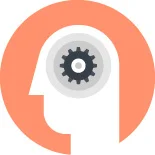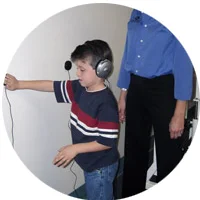Autism Spectrum Disorders (ASD)
Auditory Processing Disorder (APD) and Sensory Processing Disorder (SPD) impact the brain’s ability to receive and respond to information. APD is found in approximately five percent of school-aged children and affects their ability to process heard information — most notably speech — resulting from a lack of coordination between the brain and ears. With APD, background noise makes it difficult to distinguish and process sounds. In children with SPD, the brain has trouble processing sensory information like sounds, light and touch.
APD
Auditory Processing Disorder is one of those diagnoses that may sometimes go unnoticed until a child reaches school age. Some of these children are labeled daydreamers or forgetful by teachers and even family members. For APD, your child may be diagnosed by an audiologist who performs special central auditory processing testing; this is different from the standard audiology screening.
Symptoms of APD include:
- Difficulty understanding in noisy environments
- Difficulty following multi-task directions
- Difficulty distinguishing between similar sounds
- Language and/or speech delays
- Requiring repetition or clarification (as if there was a hearing problem present)
- Easily distracted or unusually bothered by loud or sudden noises; improved behavior and performance in quieter settings
- Difficulty understanding abstract information
- Difficulty with verbal math problems
- Disorganized and forgetful
- Poor memory for word and numbers
- Trouble understanding jokes, riddles or idioms
- Difficulty in expressive language
- Seems to “tune out” when the conversation is complex or involves too many people
- Difficulties with language, learning, reading and spelling
SPD
Sensory Processing Disorder is commonly seen in developmental disorders like autism, and many treatments do not address SPD as a standalone disorder. SPD can affect one or more senses and can result in either over or under responsiveness to sensory information. Children with undiagnosed SPD may be seen as fussy or anxious, unable to handle change, and prone to tantrums. Certain sounds may send an SPD child running from the room or into a fit of tears, and he or she may cry out in pain when touched or recoil from certain textures. Alternately, individuals with SPD may seem unresponsive to their environment, even extreme heat, cold or pain.
Symptoms of SPD include:
Infants/Toddlers
- Problems eating or sleeping
- Refusing to go to anyone other than primary caregiver
- Irritable when being dressed; uncomfortable in clothes
- Rarely playing with toys
- Resists cuddling, arches away when held
- Cannot calm self
- Floppy or stiff body, motor delays
Pre-Schoolers
- Over-sensitive to touch, noises, smells, other people
- Difficulty making friends
- Difficulty dressing, eating, sleeping, and/or toilet training
- Clumsy; poor motor skills; weak
- In constant motion; in everyone else’s face and space
- Frequent or long temper tantrums
Grade-Schoolers
- Over-sensitive to touch, noise, smells, other people
- Easily distracted, fidgety, craves movement; aggressive
- Easily overwhelmed
- Difficulty with handwriting or motor activities
- Difficulty making friends
- Unaware of pain and/or other people
Adolescents and Adults
- Over-sensitive to touch, noise, smells, and other people
- Poor self-esteem; afraid of failing at new tasks
- Lethargic and slow
- Always on the go; impulsive; distractible
- Leaves tasks uncompleted
- Clumsy, slow, poor motor skills or handwriting
- Difficulty staying focused
- Difficulty staying focused at work and in meetings
Brain Training Solutions for APD/SPD
APD and SPD can impact every aspect of your child’s life, from performance in school to his or her ability to interact with friends and family. This can make it exceptionally difficult for your child to develop self-confidence as he or she struggles to find acceptance among peers or keep up with and perform normal tasks. All of the challenges of APD and SPD can be managed effectively with these drug-free Learn 2 Focus programs:
APD and SPD commonly slow the brain’s natural, internal processing speed. The Interactive Metronome<hyperlink> program works to augment that speed through intensive and focused brain training. It is not uncommon for individuals with APD or SPD to require hand over hand assistance during IM sessions in the beginning stages. As the disorder is addressed, your child’s processing will improve and he or she will be able to successfully execute all of the program tasks independently.
At Learn 2 Focus, our proven solutions can help support your child’s ability to accurately receive and respond auditory, visual and sensory information so he or she can feel “normal” and confident at school and at home.
Please visit the solutions pages to learn more about how brain training can provide the effective, lasting treatment your child needs, or call 808-352-0116 for personalized guidance.
Auditory and Sensory Processing Disorders
Virtual or In-Office Treatment | Honolulu, HI
Auditory Processing Disorder (APD) and Sensory Processing Disorder (SPD) impact the brain’s ability to receive and respond to information. APD is found in approximately five percent of school-aged children and affects their ability to process heard information — most notably speech — resulting from a lack of coordination between the brain and ears. With APD, background noise makes it difficult to distinguish and process sounds. In children with SPD, the brain has trouble processing sensory information like sounds, light and touch.
APD
Auditory Processing Disorder is one of those diagnoses that may sometimes go unnoticed until a child reaches school age. Some of these children are labeled daydreamers or forgetful by teachers and even family members. For APD, your child may be diagnosed by an audiologist who performs special central auditory processing testing; this is different from the standard audiology screening.
Symptoms of APD include:
- Difficulty understanding in noisy environments
- Difficulty following multi-task directions
- Difficulty distinguishing between similar sounds
- Language and/or speech delays
- Requiring repetition or clarification (as if there was a hearing problem present)
- Easily distracted or unusually bothered by loud or sudden noises; improved behavior and performance in quieter settings
- Difficulty understanding abstract information
- Difficulty with verbal math problems
- Disorganized and forgetful
- Poor memory for word and numbers
- Trouble understanding jokes, riddles or idioms
- Difficulty in expressive language
- Seems to “tune out” when the conversation is complex or involves too many people
- Difficulties with language, learning, reading and spelling
SPD
ensory Processing Disorder is commonly seen in developmental disorders like autism, and many treatments do not address SPD as a standalone disorder. SPD can affect one or more senses and can result in either over or under responsiveness to sensory information. Children with undiagnosed SPD may be seen as fussy or anxious, unable to handle change, and prone to tantrums. Certain sounds may send an SPD child running from the room or into a fit of tears, and he or she may cry out in pain when touched or recoil from certain textures. Alternately, individuals with SPD may seem unresponsive to their environment, even extreme heat, cold or pain.
Symptoms of SPD include:
Infants/Toddlers
- Problems eating or sleeping
- Refusing to go to anyone other than primary caregiver
- Irritable when being dressed; uncomfortable in clothes
- Rarely playing with toys
- Resists cuddling, arches away when held
- Cannot calm self
- Floppy or stiff body, motor delays
Pre-Schoolers
- Over-sensitive to touch, noises, smells, other people
- Difficulty making friends
- Difficulty dressing, eating, sleeping, and/or toilet training
- Clumsy; poor motor skills; weak
- In constant motion; in everyone else’s face and space
- Frequent or long temper tantrums
Grade-Schoolers
- Over-sensitive to touch, noise, smells, other people
- Easily distracted, fidgety, craves movement; aggressive
- Easily overwhelmed
- Difficulty with handwriting or motor activities
- Difficulty making friends
- Unaware of pain and/or other people
Adolescents and Adults
- Over-sensitive to touch, noise, smells, and other people
- Poor self-esteem; afraid of failing at new tasks
- Lethargic and slow
- Always on the go; impulsive; distractible
- Leaves tasks uncompleted
- Clumsy, slow, poor motor skills or handwriting
- Difficulty staying focused
- Difficulty staying focused at work and in meetings
Get Brain Training Solutions for APD/SPD
APD and SPD can impact every aspect of your child’s life, from performance in school to his or her ability to interact with friends and family. This can make it exceptionally difficult for your child to develop self-confidence as he or she struggles to find acceptance among peers or keep up with and perform normal tasks. All of the challenges of APD and SPD can be managed effectively with these drug-free Learn 2 Focus programs:
APD and SPD commonly slow the brain’s natural, internal processing speed. Interactive Metronome program works to augment that speed through intensive and focused brain training. It is not uncommon for individuals with APD or SPD to require hand over hand assistance during IM sessions in the beginning stages. As the disorder is addressed, your child’s processing will improve and he or she will be able to successfully execute all of the program tasks independently.
At Learn 2 Focus, our proven solutions can help support your child’s ability to accurately receive and respond auditory, visual and sensory information so he or she can feel “normal” and confident at school and at home.




